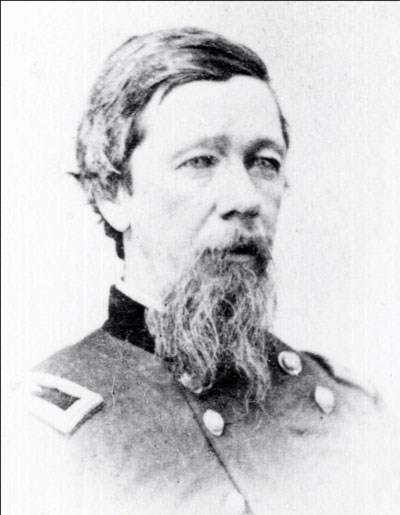
Oklahoma Historical Society Photo The son of the famous painter Thomas Sully, Alfred H. Sully, by the age of forty-eight, had amassed a great deal of experience fighting against Indians. Graduating from West Point in 1841, he saw action in both war with Mexico (1846) and the American Civil War where he won brevets for his actions during the Virginia campaigns. In 1863, during the Sioux uprising in Minnesota, he gained more notoriety by destroying a large Sioux village at Whitestone Hill, Dakota Territory. In September of 1868, with General Philip Sheridan's blessings, Sully led 500 men (nine companies of the 7th US Cavalry and Company F of the 3rd US Infantry), out of Fort Dodge into Indian Territory. His orders were to find and punish those "hostiles" responsible for the raids in Kansas during the summer of 1868. On September 12, along the banks of Wolf Creek, Sully and his men faced a large force of Kiowas, Comanches, and Cheyennes. The Indians had made false trails in the sand to set up a trap for the cavalrymen. And, to make matters worse, Sully had difficulties coordinating wagon train and troop movements when he did engage the warriors. He was exhausted, losing men, and was soon forced to reassess his situation. He believed the Indian bands had moved further south beyond his reach, and that he could no longer pursue the warriors through the rugged country with a wagon train. He finally admitted that the Indians had the upper hand and were using their knowledge of the surrounding country successfully against his troops. In the end, Sully decided to return to Kansas, in spite of criticism from his officers. He was further vilified for having conducted this campaign sitting in an army ambulance. On the trip back to Fort Dodge, Sully's troops were harassed by warriors the entire way. On November 15, Lt. Col. Sully with Lt. Col. Custer led an expedition into Indian Territory near the convergence of the Wolf Creek and Beaver Rivers. In time, they discovered a fresh trail of a war party. Sully refused Custer's request to back track this trail and attack the village from where the warriors had originated. Instead, Sully insisted that the troops travel an additional 110 miles to the floodplain of the Beaver River. Here he ordered the construction of a new cantonment which was named Camp Supply. It was at Camp Supply that the widening rift between Lt Col. George A. Custer (Brevet Major General) and Lt. Col. Alfred M. Sully (Brevet Lieutenant General) grew over which man should command. To wrestle control, both men used their brevet rank as justification for commanding the winter campaign. They also feared the arrival of Colonel Samuel J. Crawford of the Nineteenth Kansas Volunteer Cavalry, who was to join them. Crawford outranked both of them and would certainly assert his command prerogative upon arrival. The issue was resolved with the arrival of General Phillip Sheridan. General Sheridan sent Sully back to Fort Harker, Kansas, and put Custer in charge of the winter campaign which ultimately found Chief Black Kettle's camp on the banks of the Washita, November 27, 1868. In 1869, Sully was appointed Superintendent of Indian Affairs for Montana. He was promoted to colonel in 1873 and commanded the 21st US Infantry. Alfred H. Sully passed away on April 27, 1879, at Fort Vancouver, Washington. |
Last updated: August 7, 2020
